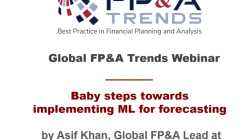A financial plan is a product used for guiding people’s actions toward the accumulation of wealth. As a product a

In the video, Asif Khan, Global FP&A Lead at PayU, shares 5 steps of implementing ML for forecasting in his

There are several key components in the FP&A role. The way profitability is analysed and used to improve the business

A financial plan is a product used for guiding people’s actions toward the accumulation of wealth. As a product a

There once was a Finance manager who met a fisherman. “Could you please tell me about your life and your

A financial plan is a product used for guiding people’s actions toward the accumulation of wealth. As a product a
Pagination
Subscribe to
FP&A Trends Digest

We will regularly update you on the latest trends and developments in FP&A. Take the opportunity to have articles written by finance thought leaders delivered directly to your inbox; watch compelling webinars; connect with like-minded professionals; and become a part of our global community.








